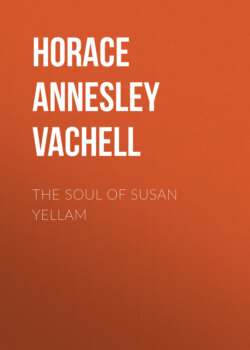Читать книгу The Soul of Susan Yellam - Horace Annesley Vachell - Страница 7
На сайте Литреса книга снята с продажи.
Оглавление"It's Tommy this, and Tommy that, and Tommy—go away! But it's—Thank you, Mr. Atkins, when the band begins to play."
Alfred was visibly impressed. He recalled the Highlander's words about war, such a war as he had never dreamed of. What if the band did begin to play? More, it surprised him that Fancy should quote Kipling. Obviously, she had enjoyed educational advantages denied to him. She spoke like the quality. He began to measure the distance between them, conscious of shrinkage in himself. To gain time he repeated her last words:
"When the band begins to play! 'No Account Harry' spoke of that, yes, he did. But war is for kings and potentates, not for us. As I came along river, I says to myself: 'We have peace here, glory be to our noble Fleet!' It gives me a mort of comfort thinking of our mighty ships. And I remember what Parson said not so long ago. 'You working-men,' he says, 'are the backbone of England.' And, by Golly! I stiffened myself accordingly."
Fancy smiled, and said no more. She glanced at the pantry clock. Alfred rose. His face was redder than usual, as he held out his hand. It consoled him mightily to reflect that "No Account Harry," by virtue or vice of an unsavoury record, would hardly dare to stick his tip-tilted nose into the Vicarage.
"So long, Miss Fancy. Would it be called presumption, if I made so bold as to ask you to take the air with me next Sunday? 'Tis wonderful pretty in the Park, and I'd like to shew you the fat bullocks."
Fancy blushed, for he was squeezing her small hand.
"I should like it very much," she replied simply.
Alfred asked for no more, wise man! He had squeezed her hand, and she had not resented it, although her slim fingers lay calm and cool within his ardent clasp. She accompanied him to the back door. In the lapel of his jacket Alfred sported one of his mother's roses. He presented it to Fancy in silence—and fled. As he passed into the park, intending to map out a pilgrimage for the following Sunday, he thought complacently:
"I'm a forcible man. Neighbours say that, and 'tis so. She's a dinky maid, bless her!"
With eager strides he mounted the gentle slope of the long escarpment between Pomfret Vicarage and Pomfret Court, keeping to the right of the main drive. The path he followed meandered through a plantation. Suddenly, he caught a glimpse of a pair of lovers strolling arm in crook, with love in their eyes and laughter on their lips. He recognised Lionel Pomfret and his bride. Alfred plunged into the hazels and let them pass. When the coast was clear he took the path again, skirting the Court and the Home Farm, and, ultimately, debouching upon the downs. Warmed by his walk, he removed his hat and fanned himself with it. Then he sat down and let his eyes wander across the landscape.
How fair it was upon that midsummer's afternoon!
A soft haze slightly obscured the water meadows. Through it he could see the Avon, a silvery riband. In the far distance the finest spire in the world soared into palely blue skies. The breeze from the land had died down. Presently the breeze from the sea would stir, tremulously, the grasses at his feet. Sheep were grazing hard by. Some of them rested in the shade of the yews which fringed the top of the down. Immediately below him stretched the park. Under the clumps of beeches stood the fallow deer. Beyond were the lawns of Pomfret Court, flanked by ancient elms and oaks and horse-chestnuts. Between the masses of translucent foliage, the façade of the house glowed faintly red as if the sunbeams penetrating the bricks during nearly four hundred years were now radiating from them.
All this to Alfred—and to how many others—was the outward and visible sign of peace, a peace sanctified by time and the labour of countless hands. That such a peace could be imperilled passed the understanding of wiser men than the carrier. Surely it would endure till the end, till eternity.
For ever and ever—Amen!
